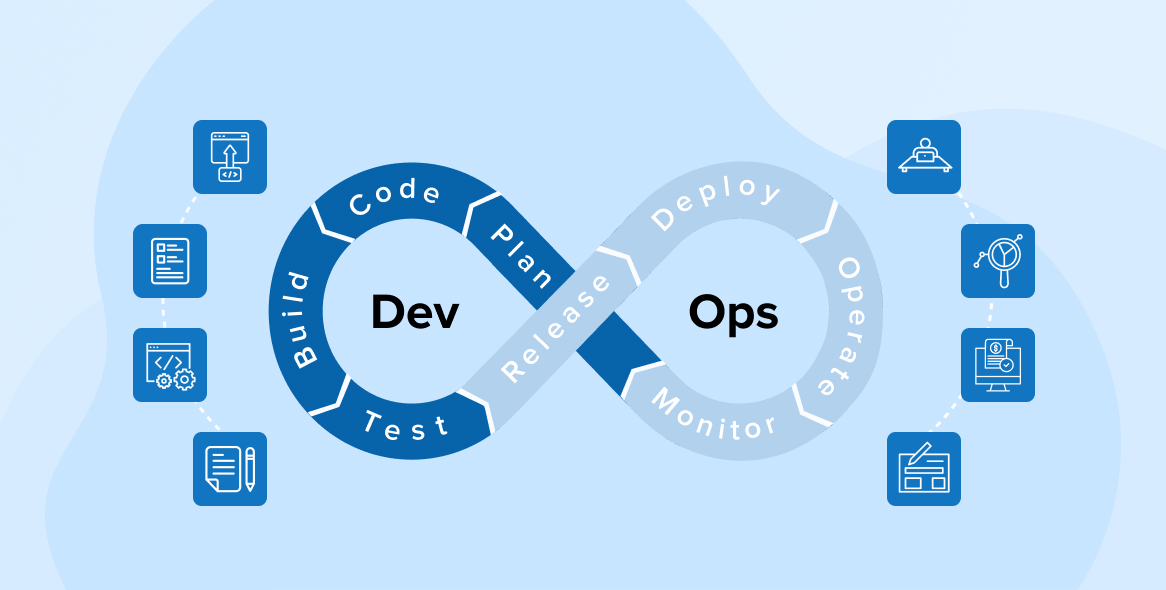When developing software for your enterprise, adopting practices that streamline the process, ensure quality, and facilitate rapid deployment is essential. One of the most effective methodologies for achieving this is DevOps. If you’re new to DevOps consulting and enterprise application development, don’t worry. I’m here to break down the essentials and guide you through the best practices to transform your software development approach.
Understanding DevOps in Enterprise Application Development
DevOps combines cultural philosophies, practices, and tools that enhance an organization’s ability to deliver applications and services at high velocity. This means evolving and improving products faster than organizations using traditional software development and infrastructure management processes. DevOps fosters a collaborative environment between development and operations teams in the context of enterprise application development, significantly improving the speed and quality of software delivery.
Critical Practices in DevOps for Enterprise Application Development
1. Continuous Integration and Continuous Delivery (CI/CD)
One of the cornerstones of DevOps is the implementation of Continuous Integration and Continuous Delivery (CI/CD). CI/CD is a method to frequently deliver apps to customers by introducing automation into the stages of app development. The main concepts attributed to CI/CD are continuous integration, deployment, and delivery.
Continuous Integration (CI) involves developers frequently merging code changes into a central repository, followed by automated builds and tests. This practice helps detect errors quickly and improve software quality.
Continuous Delivery (CD) extends CI by automatically deploying all code changes to a testing or production environment after the build stage. This ensures the code is always deployable, enabling faster and more reliable releases.
Implementing CI/CD pipelines reduces the risk of deployment failures and ensures faster delivery of new features and bug fixes. According to a 2023 report by DORA (DevOps Research and Assessment), organizations implementing CI/CD practices see 24 times faster recovery from failures and 200 times more frequent deployments.
2. Automated Testing
Automated testing is another critical component of DevOps consulting. It involves using tools and scripts to automatically test software, which helps identify bugs and issues early in the development cycle. Automated tests can range from unit tests, which test individual components, to integration tests, which ensure that different modules work together as expected.
Automated testing speeds up the testing process and ensures consistency and reliability. A 2022 study by Capgemini found that automated testing can reduce the time spent on testing by up to 50% and improve the overall quality of the software.
3. Infrastructure as Code (IaC)
Infrastructure as Code (IaC) is a DevOps practice that involves managing and provisioning computing infrastructure through machine-readable scripts, rather than through physical hardware configuration or interactive configuration tools. This allows developers to write, test, and deploy infrastructure changes with the same tools and processes they use for software development.
IaC enables more efficient scaling, reduces the risk of human error, and provides a clear audit trail for changes. According to a 2022 survey by Puppet, organizations that adopt IaC practices are 46% more likely to implement disaster recovery plans successfully.
4. Monitoring and Logging
Effective monitoring and logging are essential for maintaining application health and performance. By continuously monitoring applications and infrastructure, teams can detect and address issues before they impact end users. Logging provides a detailed record of events, which is invaluable for troubleshooting and improving system reliability.
Tools like Prometheus for monitoring and ELK Stack (Elasticsearch, Logstash, Kibana) for logging are widely used in DevOps environments. A 2023 Gartner report highlighted that organizations with robust monitoring and logging practices experience 50% fewer outages and 30% faster incident resolution times.
5. Collaboration and Communication
At its core, DevOps is about fostering a culture of collaboration and communication between development and operations teams. This cultural shift is crucial for breaking down silos and ensuring that everyone is working towards common goals. Regular meetings, shared tools, and transparent processes help build trust and improve efficiency.
A 2023 Atlassian survey found that organizations with strong DevOps cultures are 2.5 times more likely to exceed their performance goals. Effective communication and collaboration lead to better decision-making, faster problem-solving, and a more positive work environment.
How VoxturrLabs Can Help
Navigating the complexities of DevOps and enterprise application development can be challenging, especially if you’re just getting started. This is where VoxturrLabs comes in. With their extensive experience in DevOps consulting, VoxturrLabs can guide your organization through the entire process, from initial assessment to full-scale implementation.
VoxturrLabs begins by understanding your specific needs and challenges. They thoroughly assess your current processes, tools, and workflows to identify areas for improvement. This tailored approach ensures the DevOps strategy aligns with your business goals and objectives.
Conclusion
Embracing DevOps practices in enterprise application development is not just a trend; it’s necessary in today’s fast-paced digital world. By adopting best practices such as CI/CD, automated testing, IaC, monitoring and logging, and fostering collaboration, your organization can achieve faster deployments, higher quality software, and improved overall efficiency.
As you embark on your DevOps journey, remember that expertise and guidance can make a significant difference. By partnering with a knowledgeable and experienced team, you can ensure a smooth and successful transition to a DevOps-driven approach, ultimately delivering superior enterprise applications that meet and exceed your expectations.

